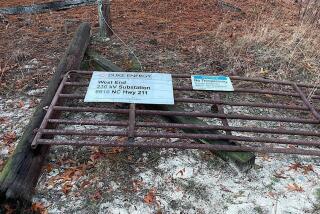Maine: No Power, No Problem
- Share via
PORTLAND, Maine — Eighty percent of the state is covered with forest, but only one gnarly old oak matters to Kristin Downing. She watched it grow by the side of her family’s house for 22 years, and last week she watched it take on a crystalline coating of ice and begin dropping limbs onto power lines like bombs from above.
The phones went out, the temperature plunged, the water turned frigid, but Downing’s parents merely dusted off an old coal stove. They began collecting the branches that tumbled from the trees that had turned into eerie ice sculptures along their suburban Portland street.
“It’s cold, it’s dark. But they’re still there,” said Downing, 23. “I tell you, though, I finally moved in with a friend with power. The hot shower was irresistible.”
The epic ice storm that has paralyzed much of the Northeast knocked out power to one of every two people in this faraway corner of the country, but only a few thousand of them took advantage of the network of emergency shelters that sprang up in the storm’s aftermath. Most would rather sleep in their cars with the engines running, barbecue on their back porches or shack up with a relative with a wood stove.
“This is a Maine tradition,” said Richard Sklar, an American Red Cross official. “They’re going to tough it out and stay at home. It’s part of the Maine myth.”
Sklar was in charge of a Red Cross shelter set up at an elementary school in the rural town of Poland, northwest of here. But only 48 people had claimed a cot by Monday afternoon, the sixth day of power outages for the vast majority of people in town. “There is this can-do tradition of do-it-yourselfness here,” said Sklar, a 70-year-old Bronx native who was lured to Maine by the clean air and low crime rate 20 years ago. “A lot of it is myth, but a lot of people believe the myth. You know, Maine is way up here, like the upper arm of the United States. People are used to being at odds with the elements.”
An ice-encased tree branch tore a hole in Sklar’s own roof like a well-aimed artillery shell, and he moved in with his daughter, who has a wood stove. “Being out of your house upsets your equilibrium,” he said. “I go to my own home every day, and it’s so cold and dark and quiet and empty. I feel it wants to say hello to me, but it’s too frozen to do it.”
Central Maine Power, which supplies electricity to roughly 80% of the population, was still struggling Monday to restore power to 142,000 customers--down considerably from a peak of 275,000 who were without electricity on Friday, said spokesman Clark Irwin. He said the company had enlisted utility crews and tree-removal firms from throughout New England and as far away as Detroit and Baltimore, although power was still likely to be out for many well into this weekend.
The Associated Press reported that more than 400,000 Mainers remained without power on Monday.
“I myself am at Day 6 at home without power,” Irwin said. “The chairman of the board and the CEO don’t have service. It is a democratic disaster.”
The ice storm hit Maine particularly hard because it is so heavily forested and because the bulk of the population lives in rural areas. Irwin estimated that one of every two residents was affected by the storm, which he said will “easily” surpass the $12 million in damage to the electrical system inflicted by Hurricane Bob in 1991.
The bad weather, which seemingly bent, bowed or broke the top off every tree in sight, has brought out the best and worst of human nature. Although the relief agencies have been overwhelmed by the number of volunteers working the shelters and donating food and blankets, other people were trying to cash in on the catastrophe by charging exorbitant rates for generators, kerosene, even water. State officials and power companies warned residents to beware of people charging fees to clear trees from power lines with the promise that electricity would be restored that much faster.
And the No. 2 power company in the state, Bangor Hydro-Electric Co., said it had a deal to buy electricity from a small, private power plant, which at the last minute decided to hike its price, spokesman Bill Cohen said.
Bangor Hydro-Electric lost eight continuous miles of transmission line in the storm, affecting power to 10,000 customers. Cohen said the company had hoped to buy power from a plant in Jonesboro owned by the Indeck power company, which he said has its headquarters in New Jersey. “They decided they would take us for a ride,” he said. The deal fell through. The company said it referred the matter to the Maine attorney general’s office, which had been warning that profiteering during disasters is against state law.
A man who answered the phone at the Indeck plant in Jonesboro referred all calls to corporate officials at a number in Illinois, but there was no answer late Monday night.
Marcel Blanchette, who runs a small grocery with his son and daughter in the central Maine city of Lewiston, said he made it a point not to raise his prices even though the food and water, and particularly the beer, are flying out of his store as fast as he can stock it.
“Other people are just jacking everything up, and I just don’t see it. Woman across the street calls in an electrician to have him put an output box on her house for her generator, and he tells her: $800!” Blanchette, 64, sputtered in anger. “He told her, ‘Call me in two weeks and it’ll be $300.’ ”
Many people here consider that sort of practice, if nothing else, in poor taste in a place where people have managed to muddle through the disaster with a measure of stoicism and good humor.
The storm’s “almost nice in a way,” said Blanchette, who has been in business in Lewiston for 32 years. “Neighbors who never talked to each other are out there collecting wood together.”
Lewiston resident Alban Theriault sent his wife, daughter and grandchildren to live in a hotel in Portland, but he has no plans to leave his town, one of the worst-hit areas in the state. He stayed behind in the house, sans power or heat save for a wood stove, and sneaks an occasional shower in his son-in-law’s funeral home.
“It’s nice and quiet,” he said as he bought a sandwich at Blanchette’s store. “Nobody bothers me there.”
Theriault, a 76-year-old retired auto mechanic, used to spend weeks in the woods trapping fox, mink and beaver with his father when he was a boy. He said he spent months in a foxhole in Italy during World War II. This ice storm, he said, is just a little inconvenience.
“No power, no heat, no light, no nothing,” he said. “Trees crash to the ground. I got a fireplace downstairs and I just keep feeding it. You got to expect this sort of thing at least once in your lifetime. Never thought once about going into a shelter.”
More to Read
Sign up for Essential California
The most important California stories and recommendations in your inbox every morning.
You may occasionally receive promotional content from the Los Angeles Times.












